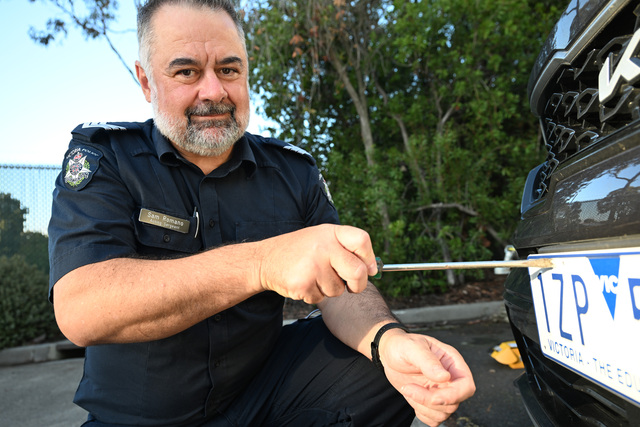“Welcome to Drug Court – we look forward to working with you for the next 12-24 months.”
Magistrate Gerard Bryant looks into the eyes of a new inductee to the Dandenong Drug Court. It’s Thursday, which is sentence day – a day of either hopeful new starts or crushing ends.
For new inductees, it marks the start of their 12-month or 24-month drug treatment orders (DTOs).
These are serial, serious offenders who are otherwise facing jail time of up to two years.
One rapidly taps his feet as he tells Mr Bryant why he wants to join the intensive program of up to 24 months.
It marks his best-ever chance to rebuild his life, to put an end to his years of drug-fuelled criminality.
An independent evaluation found the drug-court regime more cost-effective than prison.
Most strikingly, its brand of “therapeutic jurisprudence” has also delivered lower re-offending rates.
Despite also expanding to Melbourne Magistrates’ Court, the Dandenong branch is at its capacity of 60 participants – with a three-month waiting list.
Mr Bryant tells offenders that they’re privileged to have been enlisted in the Drug Court – a “world-class” model with a “huge” array of services and programs, he says.
“As you’ve heard from participants, you’ve got to want to change.
“What you’re asking for is an opportunity to transform yourself to someone who is considered a great dad, a great son and who can make a meaningful contribution to the community.
“One thing you need to understand at the outset is you’re not going to be able to finish this order with the same associates if they’re involved in drugs and crime.”
An experienced participant chimes in: “It’s impossible.”
Mr Bryant continues: “You’ll be assessed by what you do, not what you say you are going to do.”
‘Jamie, who pleads guilty to a long list of charges, is applying for a DTO in lieu of jail.
He faces a packed schedule of daily appointments, weekly reviews, three urine tests a week as well as every possible support such as stable housing, drug rehab, counselling, job and life skills coaching and social opportunities.
“I’m addicted to drugs,” he tells the court.
“I keep reoffending because of drugs.”
Speaking from a remand prison video link, he says he wants to reform for the sake of his family and teenage daughter.
Mr Bryant warns inductees that the order is onerous – harder than community corrections orders. That they won’t succeed if they’re not committed to reforming themselves and just hoping to dodge jail.
The magistrate calls on other participants to tell Jamie what he’s getting himself into.
“I tell everybody that a DTO is the most intensive and demanding thing I’ve done in my life,” a participant in his late 40s says.
“If you’re not looking towards abstinence, it’s the wrong thing for you.
“There’s no tolerance. You miss, you get a sentence – you find yourself in the cells very quickly.”
Another recent inductee has a long history of substance abuse and jail time.
“It’s hard but it gets easier,” he says.
“The level of support is fantastic, better than a community corrections order.
“I found out a lot about myself with support and the counselling.”
On review days, the court has an air of informality. Participants who make progress get applauded by the courtroom, earn medals and other rewards.
But this isn’t the case for all participants.
This Thursday, some are led from the police cells into the dock after being picked up on an arrest warrant.
They have strayed back with old friends, back onto the drugs and missed the intensive daily appointments. They face at least seven days in jail.
At worst, their order will be cancelled – with the certainty of being re-sentenced to a long stint behind bars.
It’s crushing for them. And who knows what their tearful families and supporters in the gallery have been through.
Mr Bryant tells a prisoner that he’s surprised and disappointed that he had seemed to walk away from the program. He locks him away for 14 days, while pondering the fate of the prisoner’s DTO.
Another who’s pale and drawn is led in the dock. He’d gone AWOL six days into a seven-day stint at residential rehab after complaining of “hearing noises” during detox.
The court heard that he had an adverse reaction to drugs prescribed by a GP that led to him missing court and winding up in hospital.
The police prosecutor who apologises for “sounding like a broken record” argues for the man to be kicked off the program.
Near the end of his two-year DTO, the man’s compliance had been “sporadic at best”. In his case, police had called for its cancellation several times.
After the man serves seven days in custody, Mr Bryant directs him to go to SECADA drug-and-alcohol clinic.
“If you walked out (of rehab) after one or two days, the submissions of the prosecution would have more weight.
“In fairness to you, if the decision to leave is just one day short … that has some basis to being a mental health crisis.”
Mr Bryant says the man will serve his DTO in residential rehab. To free him into the community at this stage would be “futile”.
Another would-be inductee Simon enters the court dock and applies for a DTO. He has spent time in prison and has been remanded for the past eight months on serious charges.
His predicament was like turning around a ship that had sailed 30 years in the wrong direction, he said.
Things had been looking good after four months in rehab. When released, he spent four months clean and landed a job.
Then an old friend just released from jail visited him. He lured him back on ‘ice’ and he went down the old slippery slope of drugs and crime.
Desperate to be a good partner, dad and son, he said a DTO had been recommended by other prisoners.
“It’s perfect for me at the moment.”







